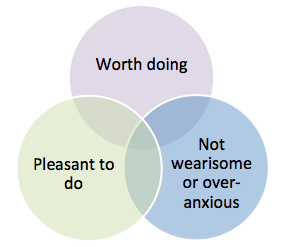It is right and necessary that all men should have work to do which shall be worth doing, and be of itself pleasant to do; and which should be done under such conditions as would make it neither over-wearisome nor over-anxious.
- William Morris, ‘Art & Socialism’
About 7 months ago, I left my role as an assistant knowledge manager at a silver circle law firm, where I had been working for 18 months, to took up a maternity cover post as an assistant librarian in a specialist health research school. This was a slightly scary, but ultimately brilliant decision. I have remembered what it’s like to get up in the morning and genuinely look forward to getting in to work, and I will miss the place and the people hugely when I have to move on in February next year. When contemplating making the move from private to public sector, from business support to customer service, and from permanent job to temporary post, and now again as I turn my eye reluctantly back towards the jobs market, I have given a lot of thought to the worth of work: to what extent it has meaning (and to what extent it should); what it gives, or can give, beyond simply getting paid; and, most importantly, what makes for a good job, a happy worker.
To some people, of course, work is simply a means to an end – they put time in, get money out, and consider this a price worth paying in order to support their ‘real life’ – their home, their family, their social life, their hobbies. For other people, their work is the cornerstone of their identity, central to their conception of themselves. It would be easy to imagine that the former, lacking the emotional investment of the latter, would be less committed, less focussed, more prone to inefficiency and errors. But I think someone to whom work is so much more than ‘just a job’, whose job is not giving them what they need, can be far less competent than someone to whom the nature of the work they do is a matter or serene indifference.
I think a good analogy is food. Like work, we need food to live. Some people’s relationship with food does not go beyond that simple fact – they eat what they need, when they need it, and that’s the end of that. However, a lot of people’s relationship with food is much richer, more emotional, less rational. Food is not just fuel; it can be love, comfort, fellowship, sensuality; or it can be compulsion, distraction, guilt, self-loathing, punishment. This connection can also turn completely on its head; food – previously merely a stage upon which to act out one’s internal psychodramas – becomes instead their subject, either as a glorious, fulfilling passion or a destructive, dark obsession. So it is with work. The more work means to you, the more it can do – both for you or to you.
I am – in case you hadn’t guessed – very much in the latter camp (in both respects). Food for me will never be just fuel; and work for me will never be (no matter how much I might sometimes wish it would) a simple exchange of labour for cash. I have been in employment in one capacity or another since I was 14, and have had wonderful jobs and awful ones. The work I have done and the environment in which I have done it has had a massive impact on my general wellbeing, at least as big a factor as my personal relationships. Work matters to me in ways that go far beyond being able to make the rent. A bad job can make for a bad year, all by itself. A good job, on the other hand, can give an otherwise difficult time in one’s life real joy and meaning.
It seems to me that there are three main factors that make a job pleasurable, although these factors can be broken down further. They broadly follow the Morris quote above, and jobs I have had could be plotted on the Venn diagram the three elements of the quotation form:
-
 Work worth doing: You both understand and approve of the result of your labour – directly in the labour itself, and/or the larger aims and achievements it contributes to.
Work worth doing: You both understand and approve of the result of your labour – directly in the labour itself, and/or the larger aims and achievements it contributes to. - Work pleasant to do: The process of the labour is interesting and enjoyable on its own account, quite apart from the value of the result or the remuneration offered.
- Conditions neither wearisome nor over-anxious: Competence is attainable, without the work becoming tedious. You feel secure but not stuck in your position.
Of course the content of these categories will be different for everyone, but theoretically, at the point these circles cross lies that individual’s perfect job. The real challenge lies in working out the elements that populate your personal circles, and perhaps even more importantly, which compromise will be most bearable if the perfect central sector cannot be reached.
Over time, I have come to realise that for me the most important circle is the first: if I don’t believe the work I do is in some way worth doing, it doesn’t matter how enjoyable it is to do or how well I am capable of doing it – my motivation crumbles rapidly, my self-esteem plummets, and I feel both frustrated and ashamed. This is why I haven’t pursued a career as an arts academic, even though I enjoyed reading and analysing texts and the research and writing up process, and even though I was quite good at it – I could never convince myself, either at undergraduate or masters level, that what I was doing was of any appreciable benefit to anyone but myself, and so over time became miserable.
This is key. My method of determining the value of my work is pretty subjective; there is no overarching ethical framework I refer to in order to benchmark the value of my contribution, despite my holding the usual left-wing inclinations towards a nebulous concept of ‘the public good’. Yes, I am much happier now I know that my daily graft is as part of an organisation that is trying to save lives, rather than one that is trying to move money around from one wealthy company or individual to another. But there is a lot more (or possibly less) to my newfound job satisfaction than that.
Fundamentally, my work attains value in my eyes at the point I see it make a positive impact on others. However, it is not always enough for me to know in the abstract that something I do has been of benefit to a colleague or a service user. Rather predictably, as for a mouse in a lab ever questing for the cheese, the effect is amplified exponentially through reward – not financial reward, but recognition of the value added and appreciation of my efforts by the recipient. A simple ‘thank you’ can make me a half-inch taller for the rest of the day.
This is why working bar was actually one of the most fulfilling jobs I ever had – the work/value/reward loop was beautifully simple: customer comes in and asks for drink; I bring drink; customer is satisfied and says thank you; I feel useful and appreciated. Job’s a good’un.
Of course, not all meaningful work is so obvious or so easy. My desire to provide a perceived benefit to others, to get that hit of recognition, can make it difficult for me to engage positively with more long-term, strategic or background work. For example, advocating changes and improvements can be difficult for me when the proposed beneficiaries do not immediately recognise the merit of my proposals. I can quickly lose confidence in what are fundamentally good ideas, and become easily discouraged by others’ lack of enthusiasm. I am much more comfortable delivering a neatly wrapped package of Desired Result to people than I am getting them involved with the process, to try and persuade them to change their ways, to help them find better ways to achieve results for themselves. I want to make it easy on them, to give them what they want. It’s the desire for that pat on the head, that sugar-lump. Quite embarrassing, really.
It’s also a dreadful way of working, for a number of reasons. For one thing, service users don’t always know what they want – they don’t always even know what’s possible – and they certainly don’t always know what they need. A lot of good ideas and projects will fall by the wayside if the person with the knowledge doesn’t have the confidence and charisma (and, occasionally, the brass neck) to push them through opposition or apathy. For another, being purely reactive and eager to please are not qualities inherent in good management. As I continue to progress in my career, I will be called upon more often to decide, to lead and to instruct, to go beyond my instinctive impersonation of the Genie of the Lamp.
The increased amount of information skills teaching I do in my current job (as distinct from the training I have delivered in previous roles) is an excellent remedy for this impulse. So much of it is about helping people to help themselves, and showing them better ways of doing things they often think they already know how to do ‘well enough’. I have had to quickly develop a thicker skin in the face of incomprehension or reluctance, and quell my instinctive urge to do things for people rather than helping them to understand how to do things for themselves. I literally have to sit on my hands sometimes to do this, but I am getting better with every session.
And I’m still getting my satisfied-customer kicks – the incredibly positive and generous feedback students give when they get it is unbeatable; being credited in the acknowledgments of someone’s Masters dissertation is a total joy. True, it’s a longer game than slinging drinks, but the payoff is a lot more valuable to me: not just the satisfaction of having delivered ‘a good result’, but the confidence to set the parameters of what that good result looks like myself.

